|
|
|
Sort Order |
|
|
|
Items / Page
|
|
|
|
|
|
|
| Srl | Item |
| 1 |
ID:
132170
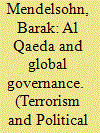

|
|
|
|
|
| Publication |
2014.
|
| Summary/Abstract |
In recent years, statements by al Qaeda leaders have included references to topics often associated with global-governance proponents' critique of the state. This article examines the organization's attitude toward symbols of global governance, giving particular attention to its view of the United Nations as the foundation for global governance, and to the manner in which al Qaeda approaches the central questions of environmental threats and human rights. The organization is seeking to insert itself into the discourse of global governance and use it in an instrumental manner; it focuses on anti-Western narrative and seeks to expose the existing order as designed by Western powers, particularly the United States, for self-serving reasons. However, the article argues, notwithstanding al Qaeda's reputation for sophistication in manipulating public opinion, the organization's references to global governance underscore the limitations its rigid ideology imposes on its messaging efforts. Even though adopting the global governance discourse is in line with the group's effort to improve its image, al Qaeda's extremist ideology limits its ability to take full advantage of the benefits this discourse offers.
|
|
|
|
|
|
|
|
|
|
|
|
|
|
|
|
| 2 |
ID:
188108
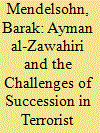

|
|
|
|
|
| Summary/Abstract |
What challenges do newly appointed terrorist leaders face? The paper proposes four primary needs all new leaders consider, including acceptance by the organization’s members, assuming control, maintaining organizational coherence and unity, and overcoming counterterrorism pressures. The magnitude of each challenge may differ depending on the predecessor’s character, the organization’s institutionalization level, the group’s ideological and strategic coherence, the availability of material resources, and communal support. This analytical framework is then used to assist the paper’s second objective: understanding how Ayman al-Zawahiri, who succeeded bin Laden, negotiated these challenges and the tradeoffs he made. Shifts in Al Qaeda’s operational environment required al-Zawahiri to confront challenges more complex than his predecessor had faced, even as he had fewer tools to solve them. Facing authority crisis, magnified by the incoherence between Al Qaeda’s central leadership and its branches and Al Qaeda’s inability to control its branches, al-Zawahiri increased decentralization, embraced affiliates’ local focus, promoted efforts to raise Al Qaeda’s local appeal, and sought to reduce U.S. interest in targeting the group. He kept Al Qaeda alive, but saw its stature shrink significantly.
|
|
|
|
|
|
|
|
|
|
|
|
|
|
|
|
| 3 |
ID:
179985
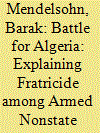

|
|
|
|
|
| Summary/Abstract |
Unity among a rebel movement is associated with positive returns, yet rebel groups often fail to come together and even fall into fratricide infighting. Focusing on a rebel field in which one group enjoys primacy, I present three pathways that are likely to produce rebel fratricide: first, power shifts within the rebel movement; second, spillover from internal conflict within the dominant group; and third, disagreements over targeting noncombatants. I explore the role these mechanisms played in fratricidal violence among the Islamist opposition in Algeria during the 1990s civil war.
|
|
|
|
|
|
|
|
|
|
|
|
|
|
|
|
| 4 |
ID:
092999
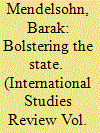

|
|
|
|
|
| Publication |
2009.
|
| Summary/Abstract |
Looking beyond the military component of the global war on terrorism this article identifies a multilateral and multidimensional effort to revamp the state-based order. This effort is guided by four principles: (i) states are the primary actors in the confrontation with the jihadi movement, and state sovereignty must be respected in the various cooperative counterterrorism efforts; (ii) as members in the international society, states hold obligations to the collective not to allow terrorists to use their territories to harm other states; (iii) because numerous states are weak, a special effort must be made to bolster states' capacities so that they will be able to realize their obligations to the society of states; and (iv) the enormous demands of capacity building necessitate particular emphasis on interstate cooperation, including the provision of assistance for weak states and sharing of best practices. The article then presents two spheres of action in the war on terrorism, indicative of this general design: the regime to suppress the financing of terrorism and states' efforts to reinforce control over their borders. It concludes by arguing that the implications of the efforts to reinforce the state-based order require that we pay it much closer attention.
|
|
|
|
|
|
|
|
|
|
|
|
|
|
|
|
| 5 |
ID:
088558
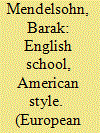

|
|
|
|
|
| Publication |
2009.
|
| Summary/Abstract |
This article addresses criticism that the English School fails to test empirically the validity of its main claims. The article takes a neglected yet highly significant aspect of the international society, its preservation-seeking quality, and tests it. It hypothesizes that if the international society truly exists and is inclined to act in order to guarantee its survival, its members should respond to threats to the existence of the society with rigorous collective action atypical of `normal politics'. To validate the hypothesis, the article examines the way in which members of the international society have responded to the systemic threat posed by the al Qaeda-led jihadi movement, focusing on the regime to suppress the financing of terrorism. Subsequently, the article lauds the theoretical contribution of the English School to understanding systemic threats, as well as its unique exposition of the war on terrorism.
|
|
|
|
|
|
|
|
|
|
|
|
|
|
|
|
| 6 |
ID:
090268
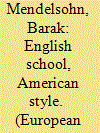

|
|
|
|
|
| Publication |
2009.
|
| Summary/Abstract |
This article addresses criticism that the English School fails to test empirically the validity of its main claims. The article takes a neglected yet highly significant aspect of the international society, its preservation-seeking quality, and tests it. It hypothesizes that if the international society truly exists and is inclined to act in order to guarantee its survival, its members should respond to threats to the existence of the society with rigorous collective action atypical of `normal politics'. To validate the hypothesis, the article examines the way in which members of the international society have responded to the systemic threat posed by the al Qaeda-led jihadi movement, focusing on the regime to suppress the financing of terrorism. Subsequently, the article lauds the theoretical contribution of the English School to understanding systemic threats, as well as its unique exposition of the war on terrorism
|
|
|
|
|
|
|
|
|
|
|
|
|
|
|
|
| 7 |
ID:
103422
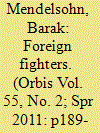

|
|
|
|
|
| Publication |
2011.
|
| Summary/Abstract |
Beginning with a historical perspective on foreign fighters, this article then seeks to clarify ambiguities and biases that shape how we often analyze the foreign fighter phenomenon. The central focus is then on the evolving trends and activities of the movement. A new generation of fighters has emerged who are comfortable as terrorists, recruiters, trainers and media propagandist, among other specialties. The author concludes by assessing the significance of the problem today.
|
|
|
|
|
|
|
|
|
|
|
|
|
|
|
|
| 8 |
ID:
158022
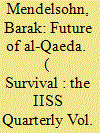

|
|
|
|
|
| Summary/Abstract |
Despite its failure to mount a spectacular attack on the US homeland in 16 years, interest in al-Qaeda is back in fashion. This is not entirely surprising: the United States’ account with the group responsible for the 9/11 attacks will remain open as long as al-Qaeda exists. For its part, al-Qaeda still proclaims its hatred of the United States, views the fight against the US as a necessary step toward the attainment of its political and strategic objectives, maintains a forward presence in Syria and actively plots to attack American interests.
|
|
|
|
|
|
|
|
|
|
|
|
|
|
|
|
| 9 |
ID:
113300
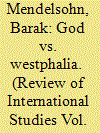

|
|
|
|
|
| Publication |
2012.
|
| Summary/Abstract |
This article presents the operation of al-Qaeda and Hizb ut-Tahrir, two of the most radical Islamist movements, through the lens of the relationship between religion as an organising principle for world politics and the state-based logic. It examines these groups in the context of repeated attempts by religious actors throughout history to render religion the dominant and constitutive element in world politics. Prior to the Peace of Westphalia, religion had a critical role in shaping the political landscape, but Westphalia relegated religion to a secondary position. While it accepted religion's role in the domestic affairs of the units in the international system, the Westphalian order kept religion subordinated to the logic of the state system. But religion maintained its ability to provide an alternative organisation for world politics. While al-Qaeda and Hizb ut-Tahrir are highly unlikely to bring about systemic change, their ascendance should remind scholars that the existing order is not inevitable and that the resurgence of religion in international politics also involves the resurrection of interpretations of religion that compete with and challenge the logic of the state-based system.
|
|
|
|
|
|
|
|
|
|
|
|
|
|
|
|
| 10 |
ID:
188049
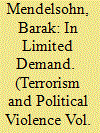

|
|
|
|
|
| Summary/Abstract |
The wars in Syria and Iraq attracted about 45,000 individuals from outside the arenas. Most joined the Islamic State, but interestingly, other prominent armed groups showed less interest in foreign volunteers. This paper introduces the Demand for Foreign Volunteers Theory (DFVT) to explain the diverging choices Jabhat al-Nusra, Ahrar al-Sham, and the People’s Protection Units made. The theory links four variables that shape groups’ positions: political considerations, operational needs, organizational capacity, and ideational fit. Both operational and political considerations emphasize the motivation for using foreign volunteers, though the two are not equally important; when they conflict, political considerations take priority. Organizational capacity, on the other hand, determines a group’s ability to translate need into action, serving as a necessary—but insufficient—condition for foreign mobilization. Finally, ideational factors, specifically a group’s identity and ideology, determine the pool of potential recruits. The case studies show that political considerations made all three actors cautious about recruiting foreign fighters, though these considerations differed between groups. Ultimately, despite the availability of sufficient organizational capacity, all groups found it risky and even undesirable
|
|
|
|
|
|
|
|
|
|
|
|
|
|
|
|
| 11 |
ID:
146182
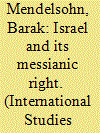

|
|
|
|
|
| Summary/Abstract |
Why do states responsible for unleashing violent nonstate actors fail to halt them despite rising costs and, at best, marginal utility? I argue that a historical-institutionalist approach helps scholars understand these dynamics. I present five path-dependent mechanisms—change in the balance of power, spiraling perception of threat, ideological shift among the public, state penetration, and weakening of the principle of state primacy—that diminish the prospects of policy reversals. I then demonstrate the usefulness of path-dependency analysis in the case of Israel’s entanglement with the Jewish messianic Right. Applying the theoretical framework sheds light on the process that brought Israel prohibitive costs—undercutting the Israeli-Palestinian peace process, undermining the state’s international standing, and weakening the state’s authority and democratic nature—and made policy reversal, in line with the state’s national interest and its responsibilities as a member of the international society, highly unlikely.
|
|
|
|
|
|
|
|
|
|
|
|
|
|
|
|
| 12 |
ID:
057460
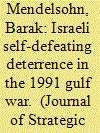

|
|
|
| 13 |
ID:
191542
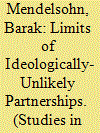

|
|
|
|
|
| Summary/Abstract |
Why did Syria collaborate with al-Qaeda’s Iraqi branch after 2003 and with ISIS during the Syrian civil war? States’ support for terrorist groups is risky, but cooperation with jihadi actors who see the Syrian regime as an enemy and wish to impose a radical Islamic rule in its stead is particularly dangerous. This paper argues that such ideologically-unlikely partnerships reveal the workings of the instrumental logic behind state-sponsored terrorism. Collaborating with terrorist groups is a rational strategy. States such as Syria will partner with ideologically-incompatible terrorist groups when they judge there to be a greater and more urgent threat from a third actor; when they believe the partnership would give them unique capabilities or produce special, otherwise unattainable effects; and when they believe they can shield themselves from the relationship’s potential adverse effects. The Syrian case also shows that such a pairing is likely to have limited utility. In order to have meaningful impact, the terrorist group must have a significant role, but the greater this role is, the higher the direct danger the group poses to its ally and the greater the likelihood of international action against the sponsoring state.
|
|
|
|
|
|
|
|
|
|
|
|
|
|
|
|
| 14 |
ID:
189090
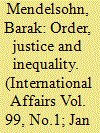

|
|
|
|
|
| Summary/Abstract |
Many calls for a just world order discussed in this special section emphasize demands for equality in the name of an underprivileged group. The focus on these equality claims and claimants could create a false impression that justice is an objective term and that justice is necessarily made in the name of equality. In reality, the equation of justice with equality is a very recent development. Throughout history, numerous actors viewed order and justice in regimes of unequal entitlement. Even the weak and disadvantaged often envisioned justice not in equality, but in an order that would place them in a position of superiority. Using evidence from the views of al-Qaeda and the Islamic State on the relation between order, justice and equality, this article shows that for some a just order does not have to be based on equality, and in fact, depends on inequalities. Those who take for granted the idea that a just order requires equality should, thus, recognize that who is deserving and deprived of equality is not the only contested question; the disagreement over whether justice requires equality, or is manifest in inequality, has yet to be settled.
|
|
|
|
|
|
|
|
|
|
|
|
|
|
|
|
| 15 |
ID:
060413
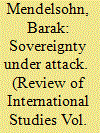

|
|
|
| 16 |
ID:
136159
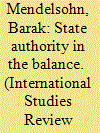

|
|
|
|
|
| Summary/Abstract |
Why do states allow and even encourage extremist nonstate actors to intervene in an international conflict in violation of domestic and international law, as well as state interests? Why do states fail subsequently to rein in these actors as the counterproductive consequences of their actions become apparent? This article explores one case of such puzzling state behavior, Israel's relationship with the messianic settler movement. The movement is challenging the state, and its actions regarding the territories Israel captured in 1967 have complicated efforts to resolve the Israeli–Palestinian conflict. Yet, not only have successive Israeli governments declined to enforce the authority of the state, they have pandered to the extremists. Supporting the messianic right has not offered Israel significant strategic benefits. In fact, it has backfired by intensifying the conflict with the Palestinians, weakening Israel's international standing, and undercutting state authority domestically. The article calls for supplementing a rationalist perspective that focuses on states' cost-benefit calculation with ideational factors. It proposes that the manipulation of symbols by the messianic right strengthened an ongoing process of state penetration, undermining the state's ability to utilize its power to its full extent, while increasing the messianics' influence far beyond the movement's material capabilities.
|
|
|
|
|
|
|
|
|
|
|
|
|
|
|
|
| 17 |
ID:
140863
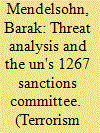

|
|
|
|
|
| Summary/Abstract |
Because of its dynamic nature, those confronting the al-Qaeda threat must follow its evolution very closely. As demonstrated here, this task is particularly challenging when counterterrorism is carried out under the aegis of international organizations. This article explores the threat identification function of the al-Qaeda Sanctions Committee (also known as the 1267 Committee) charged with supervising the UN sanctions regime against al-Qaeda and its associates. Examination of the role of threat identification in the committee's work, and of the content of the threat analysis presented in the periodic reports of its subsidiary monitoring team, suggests the marginality of strategic threat assessment and underscores the constraints created by bureaucratic and political factors. The article also demonstrates the failure of the Committee and the monitoring team to thoroughly engage in central questions regarding al-Qaeda's nature, objectives, and organizational strategy.
|
|
|
|
|
|
|
|
|
|
|
|
|
|
|
|
| 18 |
ID:
129905
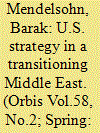

|
|
|
|
|
| Publication |
2014.
|
| Summary/Abstract |
In light of the uncertainty surrounding the Middle East stemming from the Arab Awakening, and the inability of Washington to shape the process of transition, U.S. decision- makers must rethink their strategy for the region in general and for counterterrorism in particular. Reducing U.S. involvement in the region and letting the dust settle will serve American interests better and allow for building healthier relations with Middle Eastern countries. At the same time, since the risk of negative effects on neighboring states that accompany transition must be kept in check, the United States, together with other powers, should lead the international community in reviving the principle of "state responsibility" as a productive way to reduce spillover of conflicts and even provide incentives for actors in the region to limit violence.
|
|
|
|
|
|
|
|
|
|
|
|
|
|
|
|
|
|
|
|
|